Parody religions in the space of cultural and religious life of Russia: Results of expert interview
- Authors: Zimova N.S.1, Fomin E.V.1
-
Affiliations:
- Lomonosov Moscow State University
- Issue: Vol 9, No 2 (2025)
- Pages: 77-99
- Section: Статьи
- Published: 30.06.2025
- URL: https://journal-vniispk.ru/2576-9782/article/view/301336
- DOI: https://doi.org/10.12731/2576-9782-2025-9-2-284
- EDN: https://elibrary.ru/LPNXDR
- ID: 301336
Cite item
Full Text
Abstract
Background. The article is devoted to the study of the so-called parody religions. Parody religions are religious movements that have gained popularity under the influence of mass culture at the beginning of the 21st century, the purpose of which is to mock and reduce to absurdity the doctrines and ritual practices of world religions through protest forms.
Purpose. The purpose of the study is to find out the potential for institutionalization of parody religions and their consolidation as the full-fledged participants in the socio-cultural and religious life in Russia.
Methodology. The work uses the method of expert interviews. Nine specialists (including Doctors of Philosophy and Doctors of Science) in the field of philosophy, psychology, religion, and mass media were selected as experts.
Results. The following conclusions were made in the work. The main purpose of creating parody religions is self-expression of young people and their unification in the fight against theism; the main factors of creation are secularization, westernization of Russian culture, and urbanization. The degree of influence of parody religions on Russian public culture is insignificant. Despite the lack of need for legal regulation of parody religions, they require public control, prevention of their transformation into destructive sects, etc.
Practical implications. The results can be applied when lecturing in the sociology of culture and the sociology of religion. The practical implication lies in the possibility of using separate materials of the work in the implementation of state confessional policy.
About the authors
Natalya S. Zimova
Lomonosov Moscow State University
Author for correspondence.
Email: nzimova@mail.ru
ORCID iD: 0000-0003-0545-6317
Cand. Sci. (sociological science), Docent of the School of Contemporary Social Sciences
Russian Federation, 1, Building 13, Leninskye Gory, Moscow, 119991, Russian FederationEgor V. Fomin
Lomonosov Moscow State University
Email: fominegorv@mail.ru
ORCID iD: 0000-0001-5513-4848
Cand. Sci. (sociological science), Researcher of the School of Contemporary Social Sciences
Russian Federation, 1, Building 13, Leninskye Gory, Moscow, 119991, Russian FederationReferences
- Kargina, I. G. (2014). Qualitative changes in the discourse of secularization at the end of the XX and beginning of the XXI century. Theory and Practice of Social Development, (1), 109–114. EDN: https://elibrary.ru/RVQDST
- Kublitskaya, E. A. (2023). Core values of consolidation of Russian society in the perceptions of religious and non-religious student youth. Scientific Result. Sociology and Management, 9(2), 21–42. https://doi.org/10.18413/2408-9338-2023-9-2-0-3 EDN: https://elibrary.ru/PBFDES
- Lebedev, S. D., Blagoevich, M., & Shapovalova, L. V. (2023). Revitalization of religion: Towards understanding the prospects of the modern religious situation. Sociological Studies, (8), 60–75. https://doi.org/10.31857/S013216250027367-6 EDN: https://elibrary.ru/FDKHAO
- Mikhelson, O. K. (2018). Sacralization of the popular: Methodological approaches to the study of religion-like phenomena in modern religious studies. SPbU Bulletin. Philosophy and Conflictology, 34(1), 122–137. https://doi.org/10.21638/11701/spbu17.2018.112 EDN: https://elibrary.ru/YTSJUP
- Rutkevich, E. D. (2023). Young generations and (non) religion. Bulletin of Pushkin Leningrad State University, (1), 81–97. https://doi.org/10.35231/18186653_2023_1_81 EDN: https://elibrary.ru/NTSVTX
- Sokovikov, S. S. (2021). Carnival nature of parody religions in the context of popular culture. KANT: Social Science & Humanities, (1), 52–60. https://doi.org/10.24923/2305-8757.2031-5.5 EDN: https://elibrary.ru/DYAYZH
- Herbier-Lйgй, D. (2015). In search of certainty: Paradoxes of religiosity in advanced modern societies. State, Religion, and Church in Russia and Abroad, (1), 254–268. EDN: https://elibrary.ru/UIXFLH
- Berger, P., Davie, G., & Focas, E. (2008). Religious America, Secular Europe? A Theme and Variations. Aldershot: Ashgate.
- Bruce, S. (1999). Choice and religion: A critique of rational choice theory. Oxford University Press.
- Casanova, J. (1994). Public religions in the modern world. University of Chicago press. https://doi.org/10.7208/chicago/9780226190204.001.0001
- Chidester, D. (2005). Authentic Fakes: Religion and American Popular Culture. Berkeley, Los Angeles, London: University of California Press. https://doi.org/10.1525/9780520938243
- Cusack, C. (2016). Invention in "new" religions. In The Oxford handbook of new religious movements (2nd ed., pp. 237–247). Oxford: Oxford univ. press.
- Davidsen, M. A. (2012). Future directions in the sociology of non-institutional religion. Implicit Religion, 15(4), 554–570. https://doi.org/10.1558/imre.v15i4.553
- Davie, G. (1990). Believing without belonging: Is this the future of religion in Britain? Social Compass, 37(4), 455–469. https://doi.org/10.1177/003776890037004004 EDN: https://elibrary.ru/JPOJLV
- Laycock, J. (2013). Laughing matters: "Parody Religions" and the command to compare. Bulletin for the Study of Religion, 42(3), 19–26. https://doi.org/10.1558/bsor.v42i3.19
- Luckmann, T. (1967). Invisible Religion. New York: MacMillan. 128 p.
- Possamai, A. (2005). Religion and popular culture: A hyper-real testament. Peter Lang. Brussells. 176 p. https://doi.org/10.1558/arsr.v20i3.365
- Quillen, E. G. (2017). The satirical sacred: New atheism, parody religion, and the argument from fictionalization. In New Atheism: Critical perspectives and contemporary debates (pp. 193–220). https://doi.org/10.1007/978-3-319-54964-4_11
- Simpson, S. (2011). Joke Religions: Make-Believe in the Sandbox of the Gods. Ex Nihilo, (2(6)), 91–118.
- Stark, R. (1999). Secularization, R.I.P. Sociology of Religion, 60(3), 249–273. https://doi.org/10.2307/3711936 EDN: https://elibrary.ru/HAPTNP
- Voas, D., & Crockett, A. (2005). Religion in Britain: Neither Believing nor Belonging. Sociology, 39(1), 11–28. https://doi.org/10.1177/0038038505048998 EDN: https://elibrary.ru/JPVISN
Supplementary files










